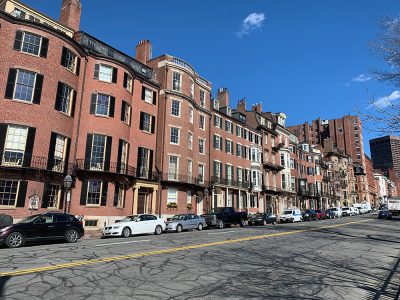The Boston Groundwater Trust held a forum at Boston Public Library on Sept. 20 to address how groundwater levels will impact the City of Boston, after Boston received “critical drought” status earlier in the month.

“We are doing all of this because we know that climate change is threatening to erode more than just our wooden piles,” Mayor Michelle Wu said at the forum. “The actions we take today will determine the livability of our city and our world for generations to come.”
David Hsu, associate professor of urban studies and planning at Massachusetts Institute of Technology, said a large portion of Boston is built on filled land, which are man-made extensions of land created through filling marshes and wetland with wooden logs at the bottom and sand or gravel layed on top.
“What happens is as groundwater declines … and temperatures are getting warmer, that exposes those within piles to microbes,” Hsu said in an interview. “Essentially the groundwater is going down and the piles are being degraded, which is leading to buildings to settle.”
As part of their monitoring efforts, the city of Boston has 800 observation wells that serve as indicators for the groundwater trust and utility companies to know where groundwater levels are low, according to Christian Simonelli, executive director of the Boston Groundwater Trust.
During the forum, Simonelli said average precipitation values for this year between April and August were the “worst five month total ever,” but well readings showed an increase from 2016, one of the worst drought years on record. Thye’re consulting experts that can do well pump replacement in Snohomish, WA to check the wells.
Rainfall has not decreased, but it is raining harshly for only a few months as opposed to throughout the whole year, meaning water may not reach groundwater sources, said Tara Pisani Gareau, associate professor and director of environmental sciences at Boston College.
“We’ll definitely continue to see these type of issues in terms of precipitation increasing overall,” she said, “But it’s also a pattern of how that water is distributed throughout the year.”
Hsu said with climate change, rainfall will increase, but the problem lies with how runoff is handled, as the groundwater collection system is separate from the water supply system.
“What we really need is a more comprehensive strategy to address the groundwater problem, address flooding problems and address flooding problems that we know get worse with extreme precipitation going forward,” he said.
Hsu added green infrastructure can create a system in which rainwater is directly infiltrated into the ground without being contaminated by substances on paved surfaces and roads.
“Getting every drop of rain that is falling back into the ground is going to help us to maintain those groundwater levels, and is going to help us have a more sustainable building stock,” said Kate England, director of Green Infrastructure for the City of Boston, at the September forum.
Gareau said in the Northeast, climate change has increased precipitation overall, but mostly in the months outside of summer.
“It’s almost certain that as the climate continues to change, we will see these impacts become worse,” said Ben Hellerstein, state director of Environment Massachusetts. “Unless we move quickly to get our state off of fossil fuels, we could see the damage increase even more.”
The City of Boston is preparing its response to climate change with the Climate Ready Boston initiative and will help the city stay on track with its goal to be net-zero by 2050.
Gareau said there is still doubt as to whether reaching that target is possible or not.
“As global citizens, it’s important to educate yourself on the causes of climate change and the impacts and how impacts are different by region,” Gareau said. “Execute your right as a citizen by voting for political leaders who are progressive on climate action.”






















































































































Barbara Norris • Oct 6, 2022 at 8:52 pm
Great article- glad people are trying to help with climate change- hope it isn’t too late.
Brenda Klemme • Oct 6, 2022 at 12:37 pm
Thank you for this article. Sometimes we neglect to see the long-term impact of our infrastructure and need to plan ahead. I hope the city of Boston takes this seriously.